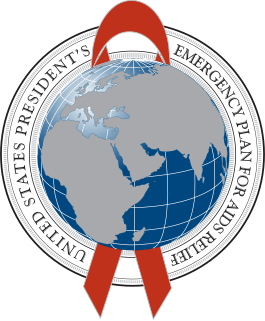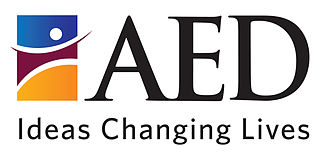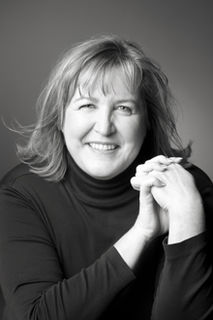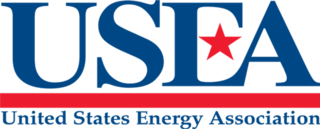Related Research Articles
The United States Agency for International Development (USAID) is an independent agency of the United States federal government that is primarily responsible for administering civilian foreign aid and development assistance. With a budget of over $27 billion, USAID is one of the largest official aid agencies in the world and accounts for more than half of all U.S. foreign assistance—the highest in the world in absolute dollar terms.

Andrew S. Natsios is an American public servant and Republican politician from Massachusetts, who served in a number of positions in the administrations of Governor Paul Cellucci and President of the United States George W. Bush.

The President's Emergency Plan For AIDS Relief (PEPFAR) is a United States governmental initiative to address the global HIV/AIDS epidemic and help save the lives of those suffering from the disease. Launched by U.S. President George W. Bush in 2003, as of May 2020, PEPFAR has provided about $90 billion in cumulative funding for HIV/AIDS treatment, prevention, and research since its inception, making it the largest global health program focused on a single disease in history until the Covid-19 crisis. PEPFAR is implemented by a combination of U.S. government agencies in over 50 countries and overseen by the Global AIDS Coordinator at the U.S. Department of State. As of September 30, 2019, PEPFAR has saved over 19 million lives, primarily in Sub-Saharan Africa.

The International AIDS Vaccine Initiative is a global not-for-profit, public-private partnership working to accelerate the development of vaccines to prevent HIV infection and AIDS. IAVI researches and develops vaccine candidates, conducts policy analyses, serves as an advocate for the HIV prevention field and engages communities in the trial process and AIDS vaccine education. The organization takes a comprehensive approach to HIV and AIDS that supports existing HIV prevention and treatment programs while emphasizing the need for new AIDS prevention tools. It also works to ensure that future vaccines will be accessible to all who need them.
DAI Global, LLC is a private development company based in Bethesda, Maryland, US with additional corporate offices in London and Hemel Hempstead in the United Kingdom.
TB Alliance is a not-for-profit product development partnership (PDP) dedicated to the discovery and development of new, faster-acting and affordable tuberculosis (TB) medicines. Since its inception in 2000, TB Alliance has worked to grow the field of available treatments for TB and now manages the largest pipeline of new TB drugs in history. It was founded in Cape Town, South Africa, and has since expanded. It is headquartered in New York City and has a regional office in Pretoria.

EngenderHealth is a 501(c)(3) nonprofit organization based in Washington, D.C., active in women's health and sexual and reproductive health (SRH) operating in nearly 20 countries Africa, Asia, and the Americas. The organization was established in 1943 and provided access to voluntary surgical contraception in the United States during its first 25 years. It has since expanded its mission to "training health care professionals and partnering with governments and communities to make high-quality family planning and sexual and reproductive health services available-today" and in the future.
In different administrative and organizational forms, the Food for Peace program of the United States has provided food assistance around the world for more than 50 years. Approximately 3 billion people in 150 countries have benefited directly from U.S. food assistance. The Office of Food for Peace within the United States Agency for International Development (USAID) is the U.S. Government's largest provider of overseas food assistance. The food assistance programming is funded primarily through the Food for Peace Act. The Office of Food for Peace also receives International Disaster Assistance Funds through the Foreign Assistance Act (FAA) that can be used in emergency settings.

The U.S. Trade and Development Agency (USTDA) is an independent agency of the United States government, formed in 1992 to advance economic development and U.S. commercial interests in developing and middle income countries.

AED, formerly the Academy for Educational Development (1961-2011), was a 501(c)(3) nonprofit organization that focused on education, health and economic development for the "least advantaged in the United States and developing countries throughout the world." AED operated more than 250 programs in the United States and in 150 other countries around the world.

The transition from a one-party state to a multi-party democracy significantly strengthened the already cordial U.S. relationship with Malawi. Significant numbers of Malawians study in the United States. The United States has an active Peace Corps program, Centers for Disease Control and Prevention, Department of Health and Human Servicess, and an Agency for International Development (USAID) mission in Malawi.

American–Uzbek relations formally began when the United States recognized the independence of Uzbekistan on December 25, 1991, and opened an embassy in Tashkent in March 1992. U.S.-Uzbekistan relations developed slowly and reached a peak following the U.S. decision to invade Afghanistan following the September 11, 2001 attacks. Relations cooled significantly following the "color revolutions" in the former Soviet republics of Georgia, Ukraine, and Kyrgyzstan in 2003–2005, and the Government of Uzbekistan sought to limit the influence of U.S. and other foreign non-governmental organizations (NGOs) working on civil society, political reform, and human rights inside the country.

The Global Alliance for Improved Nutrition (GAIN) is an independent non-profit foundation based in Geneva, Switzerland. GAIN was developed at the UN 2002 Special Session of the General Assembly on Children.

Rajiv "Raj" Shah, is the President of the Rockefeller Foundation. He is a former American government official, physician and health economist who served as the 16th Administrator of the United States Agency for International Development (USAID) from 2010–2015.
The Freeland Foundation is an international NGO headquartered in Bangkok which works in Asia on environmental conservation and on human rights. The organization intends to stop wildlife and human trafficking.

Daniel Fitzgerald Runde is a senior executive, strategist and expert in international development, international trade, investment, global business and organizational change who builds dynamic partnership alliances among governments, multi-lateral institutions, corporations, and philanthropies.

The Board for International Food and Agricultural Development (BIFAD) advises the United States Agency for International Development (USAID) on issues concerning agriculture, Higher Education in developing countries, and food insecurity. BIFAD was established by Title XII of the Foreign Assistance Act, and both the BIFAD board and Title XII recognize the critical role of U.S. land-grant institutions in food and agricultural security, domestically and abroad. BIFAD consists of seven board members appointed by the White House, four of which must come from the US Academic community. The board's mission is to draw on higher educations's expertise and scientific knowledge to advise the U.S. international assistance efforts along with domestic efforts to end food insecurity.

Maura O'Neill was named the First Chief of Innovation and was a Senior Counselor to the Administrator in January 2009 at the United States Agency for International Development. She currently is a Distinguished Teaching Fellow in the Lester Center for Entrepreneurship and Innovation at University of California, Berkeley Haas School of Business.

USEA is an association of public and private energy-related organizations, corporations, and government agencies. USEA works with the U. S. Department of Energy, U.S. Department of State and the U.S. Agency for International Development (USAID) to make energy accessible throughout the world by focusing on the politics and economics of electricity, coal, oil, gas, nuclear and renewables. Through its member organizations, USEA shares energy best practices, executes projects, and coordinates research domestically and internationally.
Public-private partnerships are cooperative arrangements between two or more public and private sectors, typically of a long-term nature. In the United States, they mostly took the form of toll roads concessions, community post offices and urban renewal projects. In recent years, there has been interest in expanding P3s to multiple infrastructure projects, such as schools, universities, government buildings, waste and water. Reasons for expanding public-private partnership in the United States were initially cost-cutting and concerns about Public debt. In the early 2000s, P3s were implemented sporadically by different States and municipalities with little federal guidance. During Obama's second term, multiple policies were adopted to facilitate P3 projects, and Congress passed bills in that direction with overwhelming bipartisan support. My Brother's Keeper Challenge is an example of a public–private partnership. Some Private-public partnerships were carried out without incident, while others have attracted much controversy.